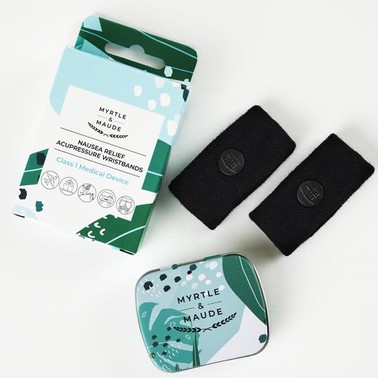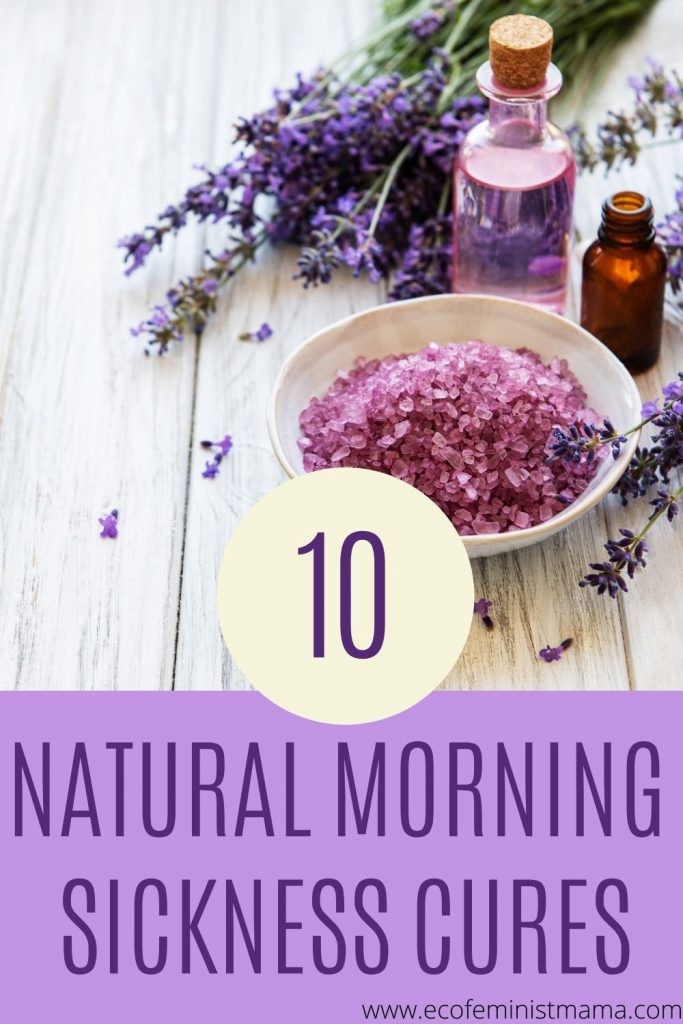There’s no denying it: morning sickness sucks.
If the movies are to be believed, morning sickness is often one of the first clues that a woman knows she’s pregnant. In reality, it might be the first symptom or it might creep up on you more slowly when you’ve already had your positive test. You might barely even get it or never manage to get rid of it. It might be limited to your first trimester or last all throughout your pregnancy.
For me, it crept up on me very slowly. I was starting to think maybe I’d get away with not having it at all but then, somewhere around 9 weeks or so, I noticed it.
Once I’d noticed it, it rarely went away until it finally disappeared suddenly as soon as the magic 16 week mark hit (my baby Ursula liked to do things by the books – all symptoms, movements and milestones came right on cue, right up until she was born slap bang on her due date!)
Knowing how awful morning sickness can be, I thought I’d do a round-up of the most effective cures for morning sickness that I’ve tried.
Table of Contents
BABY! This is a reusable block, so whatever edits you make in it will apply everywhere it is used. If you want to remove this disclaimer from a post then be careful to delete the parent block (type ‘Reusable Block’ – icon is lego brick), and not to delete the group, image and/or the paragraph blocks (cos then they’ll be deleted from every instance of the reusable block).
Disclaimer: This post contains ethical affiliate links that I genuinely recommend. I may receive a small percentage of any purchases you make as a result of clicking those links. This comes at no extra cost to you and helps me to run this site. Read my full disclosure
What is morning sickness?
Morning sickness is generally defined as nausea, sometimes accompanied by vomiting throughout the early stages of pregnancy. It is at its strongest during the first 12 trimester (first 12 weeks of pregnancy) and generally goes away by weeks 16-20.
The majority of nausea and vomiting during this early period of pregnancy is absolutely nothing to worry about, but you shoul always seek medical advice if your symptoms of morning sickness include:
- Prolonged and severe nausea and vomiting
- Symptoms of dehydration such as feeling excessively thirsty, tired, dizzy or lightheaded, not urinating often, and having dark yellow and strong-smelling pee
- Weight loss
- Low blood pressure when standing
These symptoms may be a sign of hyperemesis gravidarum, especially if they do not disappear after the usual 16 weeks that most morning sickness lasts.
Why does morning sickness happen?
There is no single cause of morning sickness but it is generally thought that the extreme hormonal changes that occur in early pregnancy are largely to blame. In particular, it is thought to be down to the arrival of the hormone human chorionic gonadotropin (HCG), which starts to be produced after the egg is fertilised. For this reason, women carrying multiples often have more severe morning sickness due to higher levels of HCG.
One of HCG’s functions is to let the body know that it is pregnant and therefore start making the necessary biological renovations, such as thickening the uterine wall and growing a placenta. I know it’s an incredibly unpleasant symptom to have, but ultimately morning sickness is a sign that your body is doing the work it needs to do to make your beautiful new baby.
What week is morning sickness the worst?
Morning sickness usually begins at around week 6 of pregnancy and tends to peak at approximately week 9.
Researchers at Cornell University believe this is due to the fact that this week in particular is a time when the foetus is at its most vulnerable to chemicals and therefore the body seeks to expel anything potentially dangerous to the future of the pregnancy. Likewise, they have found that the point at which morning sickness begins to fade is when the foetus is becoming more robust and less vulnerable to the effects of outside chemicals.
Once again, as awful as morning sickness is, it’s your body’s way of protecting your precious bundle and those with the worst sickness are possibly less susceptible to pregnancy loss.
That’s not to say if you think your morning sickness isn’t that bad that you should be worried – everyone has different thresholds so try not to compare your morning sickness to anyone else’s. Stay focused on keeping your body and your baby nourished, well rested and as comfortable as possible.
The 10 best natural remedies for morning sickness
1. Travel bands
These are top of my list as they were hands-down my most trusted morning sickness remedy. You may already have come across them in places like the travel section of the pharmacy, as they’re often used for motion sickness when driving or on a boat.
If you’re not familiar, though, these are little stretchy bands with a plastic ball in the middle which sits at a specific acupressure point on the inside of your wrist.
They’re generally very cheap and I personally found them to be a lifesaver on my early morning train ride into work. They’re also super discreet meaning that, if you’re not yet sharing your pregnancy news, you can get instant morning sickness relief without anyone else realising what you’re doing.
I definitely recommend them as your first port of call and came across these lovely ones from organic baby and maternity company Mellie & Green (not an affiliate link, by the way, I just love this company and wanted to help you find an ethical source)
They even come complete with a discrete but stylish little case, which I very much wish I’d had as they’re not something you want to get lost at the bottom of your handbag when you need them in a hurry!
2. Eat smaller meals more frequently
You might find it easier to keep food down if you’re eating much smaller quantities, so try and grazing approach to your meals and see if that helps. I certainly found that what helps with morning sickness was my stomach less food more often, especially when combined with the next tip.
3. Avoid spicy, fatty and processed foods
Once you get to week 40 and you’re begging for labour to start already you can eat all the spicy foods you like, but for now anything that irritates your stomach is going to make your life worse. Give the curries and chillis a rest for a few weeks and choose blander, less spice-heavy meals.
For me it was fatty and processed foods that were more the culprit though. I don’t often use processed food but do occasionally for convenience – however, there’s a particular brand of vegan “meat” ball that I won’t ever step foot near again after that first trimester 🤢
Funnily enough my daughter Ursula absolutely won’t touch processed food at all, even things like chips that toddlers are supposed to love – so I guess she’s always been happier on whole foods!
4. Ginger
This is a risky one because ginger has such a strong taste and smell that you might find yourself put off trying it all depending on your personal morning sickness quirks.
Ginger has been used for centuries as a morning sickness cure and now there is strong research behind it to suggest that it is effective as well as safe in combatting nausea.
Different ways to consume ginger include:
- Freshly grated and steeped in boiling water through a tea infuser
- Grated into a smoothie
- Pickled and used a condiment (most commonly found in Asian supermarkets)
- Ginger biscuits or cookies
- Ginger jam or marmalade on toast
For me, I definitely noticed it helped my morning sickness when I consumed ginger, although I have to say I suddenly went off it after a couple of weeks. The smell became one of my nausea triggers, perhaps because I’d slightly overdosed on ginger biscuits…whoops! Go easy on the cookies is the takeaway from that!
I’ve made a board on Pinterest with a range of ginger recipes if you’d like to check it out and get some inspiration.
5. Aromatherapy
Another way to benefit from the soothing effect of ginger is through the use of essential oils. As well as ginger, lemon and orange oils are often helpful in alleviating pregnancy nausea and morning sickness. You can put a few drops in a diffuser or in a carrier oil such as sweet almond oil, which you can then use for massage on the skin.
Personally I favour the diffuser for convenience and low-mess. A good quality diffuser like the Esta Aroma from Neals Yard Remedies will come in handy for use throughout your motherhood journey. They’re invaluable for everything from helping to kickstart labour, as a natural childbirth aid, during postpartum recovery, and even when your baby arrives and you’re trying to gently help them sleep without sleep training.
Of course everyone responds to scent differently so feel free to experiment with other scents to help your nausea. However, it’s important to be aware of safety when it comes to essential oils and pregnancy.
The following essential oils are considered safe or unsafe for pregnancy when diluted properly in a carrier oil (source):
| Safe for use in pregnancy | Unsafe for use in pregnancy |
| Benzoin | Aniseed |
| Bergamot | Basil ct. estragole |
| Black pepper | Birch |
| Chamomile (German & Roman) | Camphor |
| Cypress | Clary sage (unless used to induce labour after 40 weeks) |
| Eucalyptus | Hyssop |
| Frankincense | Mugwort |
| Geranium | Parsley seed or leaf |
| Ginger | Pennyroyal |
| Grapefruit | Sage |
| Juniper | Tansy |
| Lavender | Tarragon |
| Lemon | Thuja |
| Mandarin | Wintergreen |
| Majoram (sweet) | Wormwood |
| Neroli | |
| Orange (sweet) | |
| Petitgrain | |
| Rose | |
| Sandalwood | |
| Tea tree | |
| Ylang ylang |
6. Deep breathing
Simple, effective and absolutely free, this has to be the easiest cure for morning sickness going. It will be particularly effective if used in conjunction with your diffuser and essential oils from tip #5, but still works well on its own. You can do it in a quiet spot on a yoga mat or stool at the end of a busy day, or even do it on your way to work if you’re having trouble with the additional motion from the car, bus or train.
The most powerful deep breathing exercise is to inhale through your nose, deeply into your belly over 4 counts and then breathe out through your mouth as if steadily blowing a flickering candle over 8 counts. This is the simplest version but you can make it even more powerful by increasing your counts every three rounds. For example in for 4, out for 8, for three rounds. Then in 6, out 8, times three. Finally in for 8 and out for 12. I would only recommend doing this extended version in the safety of your home though, and certainly not while driving as you may get distracted.
You may also want to take the opportunity to delve more into the world of deep breathing through hypnobirthing techniques, since these will be useful for you further down the line when it comes to bringing your baby into the world. Watch Ella of Deliciously Ella fame talk about her experience with the marvellous KGHypnobirthing to find out more:
7. B6 supplement
This is a good one if you’re not a fan of the taste or smell of ginger, since one study shows it to be just as effective as a morning sickness remedy. Vitamin B6 is also known as pyridoxine and helps the body to use and store the energy from protein and carbohydrates. It also supports the body in forming haemoglobin, which is vital for red blood cells to carry oxygen around the body. Making sure you’re doing all you can to help your body maintain enough energy and oxygen should contribute to less unpleasant morning sickness symptoms.
The WholeVit pregnancy multivitamin contains the perfect blend of vitamin B6 along with the rest of your essential pregnancy vitamins and minerals. Alternatively you could take a specific B6 supplement, although you should consult with your doctor or midwife before taking additional B6 alongside a regular pregnancy vitamin.
8. Take your pregnancy multivitamin at bedtime
Speaking of pregnancy multivitamins, you may want to try taking yours just before bedtime to see if that helps your morning sickness.
The levels of iron in these important pills can make the body feel more susceptible to nausea, so simply switching to taking it just before to go to sleep instead of first thing may make the world of difference.
If you’re still having sever levels of morning sickness, you can try holding back on your iron intake until the second and third trimesters when nausea generally settles down. It’s still crucial to get your daily intake of 400mg of folic acid in the first 12 weeks of pregnancy though, so if you’re considering stopping your pregnancy multivitamin for a while to reduce your iron intake, please continue to take folic acid separately.
You can see a full list of all the nutrients you need to make sure you get throughout pregnancy in my free pregnancy nutrition guide below (designed with vegans in mind but relevant to anyone who is pregnancy and eats 🙃 )
9. Exercise
I know, I know – this is probably one of the last things you feel like doing when you’re feeling rough as hell but hear me out. Exercise is well known for its capacity to release endorphins, the pleasure-boosting hormones that make the body feel good. Endorphins react with receptors in your brain to help elevate your mood and reduce pain, two VERY helpful side effects when you’re having a difficult time with your first trimester.
Stick to relatively low intensity exercise when you’re actually experiencing pregnancy nausea, as you may inadvertently make it worse if you’re doing high intensity movements such as running and jumping. Exercises such as yoga, pilates, swimming and walking are most likely to help your symptoms by giving you a much-needed endorphin boost.
10. Stay hydrated
Another easy and cheap one to round of this top ten – make sure you stay hydrated and drink plenty of water. Dehydration makes nausea much worse so start your day by filling up a nice big bottle with fresh water (I always added a load of ice too as that seemed to help the sickness too) and make sure you sip it throughout the day. One tip though, don’t drink a lot immediately before eating as this will fill up your stomach and possibly make nausea worse.
I continue to use a big 800ml bottle with a hydration tracker like this BPA-free one from Aladdin:
A nice big water bottle will see you through labour and the fourth trimester postpartum period too, which is ultimately what we’re building up to here!
And finally…does sperm help with morning sickness…?!
So to me this has ALL the hallmarks of a tip from someone’s chancer husband taking a bet that his wife would be willing to try anything. But a surprising number of people ask this question, so it’s clearly been doing the rounds.
The idea that sperm would be a good morning sickness cure (whether, ahem, “taken” orally or vaginally) seems to stem from a theory by psychologist Gordon Gallup. His (unproven) theory is that morning sickness is caused by the body’s response to unfamiliar DNA (i.e. the biological father’s) and that a cure would be to put more of that DNA into the maternal body via the father’s sperm.
When I first read that theory it sounded a bit far-fetched to be honest, but Gallup has actually put together a pretty convincing argument that pregnant women are more likely to develop preeclampsia with a pregnancy resulting from unfamiliar semen – this, he argues, is a protective evolutionary response to things like rape or casual sex with an unsuitable partner. Please note, I am aware that this a somewhat problematic argument from a feminist perspective since it suggests that pregnancies that exist outside a heteronormative monogamous context are more likely to be “unhealthy”. He’s coming from an evolutionary perspective though and you can read the article yourself to decide how problematic it may be – just don’t shoot the messenger is what I’m saying!
There’s no strong evidence that this theory is actually true but, if you’re intrigued by Gallup’s ideas, this is a very interesting article that delves further into his thesis. If you’re just looking for morning sickness cures, though, I’d look at your partner with a healthy dose of scepticism if they offer you a big dose of their own, errr… ‘homemade remedy…’!
So there you have it, 10 effective, natural morning sickness cures that will hopefully have you feeling better in no time.
Wishing you all the best on your pregnancy and birthing journey.









